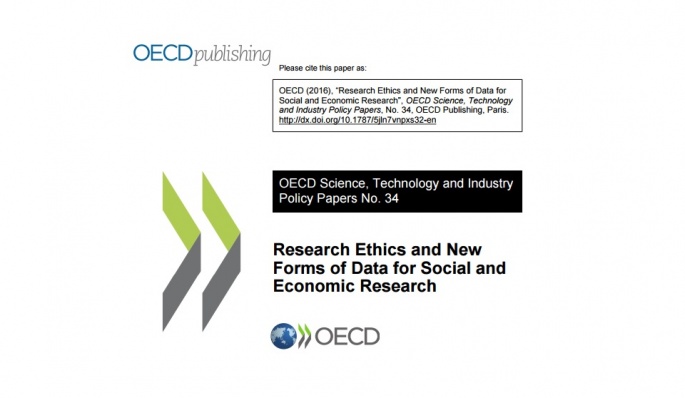New OECD guidelines on research ethics and new forms of data


The Organisation for Economic Cooperation and Development (OECD) has published guidelines on research ethics and new forms of data for social and economic research. The guidelines provide a set of high-level recommendations that can be used to underpin the ethical governance of research.
“Research data are defined ... as information relevant to, or of interest to, researchers, either as inputs into or outputs from research”, - OECD guidelines.
“The main aim of an ethics review is, as far as possible, to protect all groups involved in research: participants, institutions, funders and researchers, throughout the lifetime of the research and into the dissemination process”, - OECD guidelines.
"New forms of data have the potential to revolutionise research ... but come with significant responsibilities for data producers, researchers and data archives. Clear and consistent principles need to be applied to using these data in research to ensure that data are used in an ethical way and for the public to have confidence in research using new forms of data”, -Matthew Woollard, Director of the UK Data Service.
Although these data offer significant potential for research, with the possibility of new insights, possibilities and benefits to society, health and the economy, using them also presents ethical and practical challenges. These latter include the risk of disclosure of identities, the ethics of using such data in research and reputational risks for organisations collecting or creating data.
To meet these challenges the Organisation for Economic Cooperation and Development (OECD) has recently published Research Ethics and New Forms of Data for Social and Economic Research guidelines.
The guidelines are the culmination of a two year project by an Expert Group, appointed by the OECD Global Science Forum (GSF), and provide a set of high-level recommendations and rules that can be used to underpin the ethical governance of research, from the formulation of research proposals through to publication and dissemination of results.
The recommendations address the following issues:
Ethical principles |
The governance of research using New Forms of Data |
Legal frameworks |
Addressing specific issues |
Privacy |
Consent |
Anonymity and de-identification |
Ethical aspects of the commodification of data |
Data sharing, curation and security |
Public engagement |
APPENDIX 1. Expert Group terms of reference and membership |
APPENDIX 2. Examples of new forms of data |
APPENDIX 3. Legal frameworks in the EU, UK, USA and South Africa |
APPENDIX 4. A privacy heuristic (What, Who, Where, Why) - a ‘privacy reflection tool’ |
The sharing of expertise on, and knowledge about, research ethics between countries is critical to the creation of a common and cost-efficient ethical environment for scientific research.
# Read the full text of the guidelines HERE.
Related contents:
The Legal Interoperability of Research Data: Principles and Implementation Guidelines (from the CODATA-RDA Legal Interoperability Interest Group) on ZENODO:
One: | Facilitate the lawful access to and reuse of research data |
Two: | Determine the rights to and responsibilities for the data |
Three: | Balance the legal interests |
Four: | State the rights transparently and clearly |
Five: | Promote the harmonization of rights in research data |
Six: | Provide proper attribution and credit for research data |

